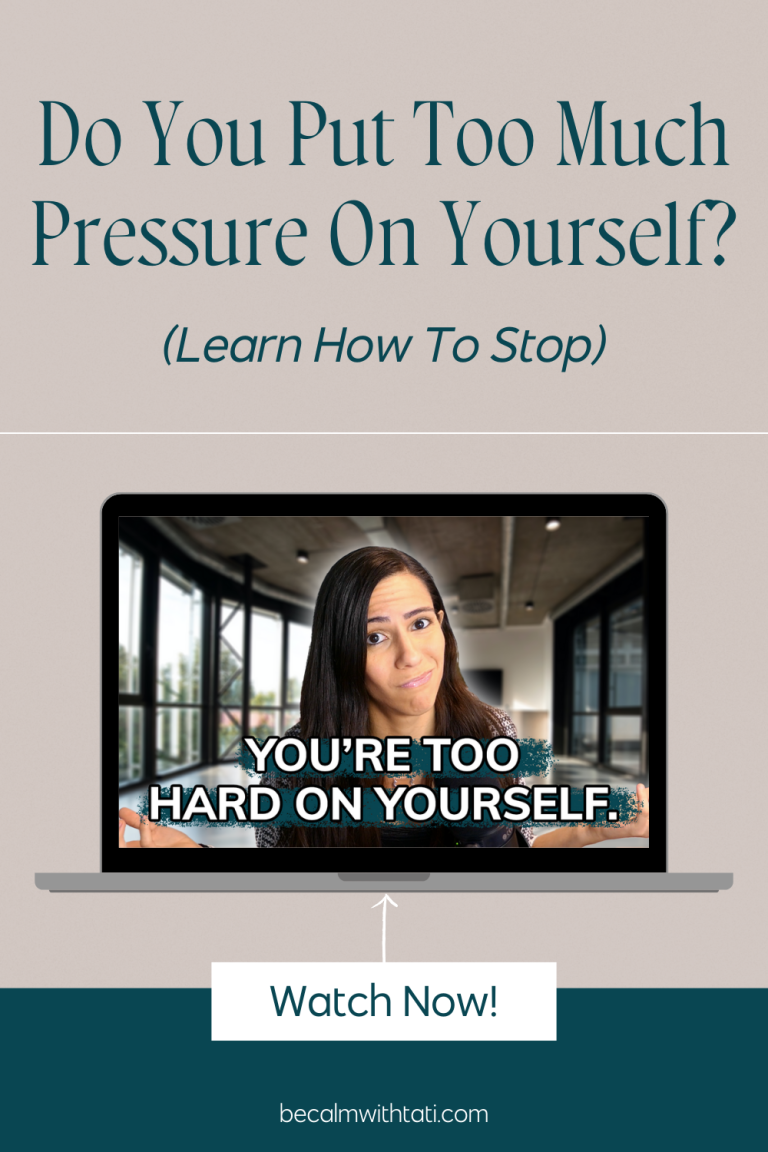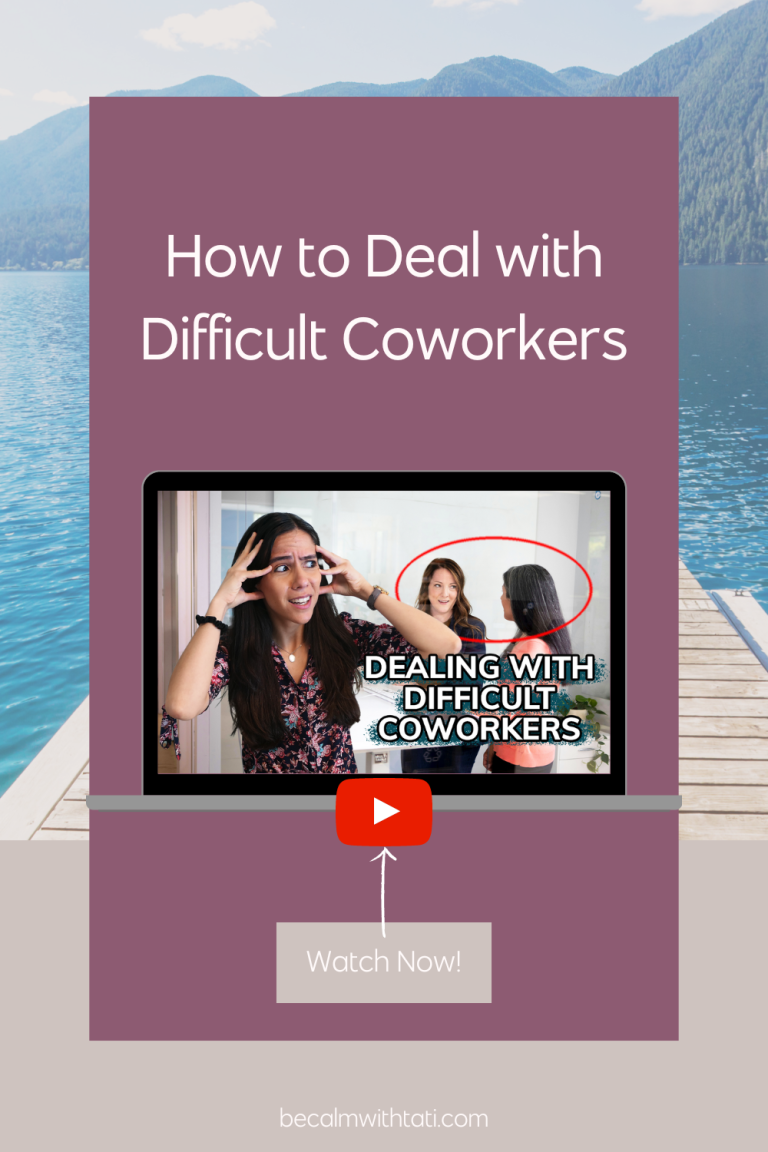STOP being so hard on yourself. I know that you think that being hard on yourself is helping you to get things done and is what you need to do in order to accomplish things. However, it’s oftentimes the opposite of that. And even if you recognize that being hard on yourself isn’t helping you, it can really be hard to get out of that pattern. In this episode, I share more about the reasons underlying being hard on yourself along with what you can do about it.
So today I’m going to talk about what happens, why you’ve become so hard on yourself and what you can do about it.
In this episode, you will learn:
- Why you’re so hard on yourself
- The negative consequences of being hard on yourself (and what to do about it)
- How you can transform your relationship with yourself to be kinder, more compassionate, and supportive— without dropping the ball
LISTEN NOW:
🎧 CLICK HERE TO LISTEN TO CALMLY COPING WHEREVER YOU LISTEN TO PODCASTS
WATCH NOW:
SUBMIT A MESSAGE, QUESTION, COMMENT OR SUGGESTION TO THE PODCAST: Message
FREE TRAINING: How to Create Work-Life Balance and Feel Calmer From Within
If you want to learn how to take back control of your life so you can feel calmer and more confident, and learn the tools to spend your time according to what matters most to you (no matter what your schedule is like right now)…
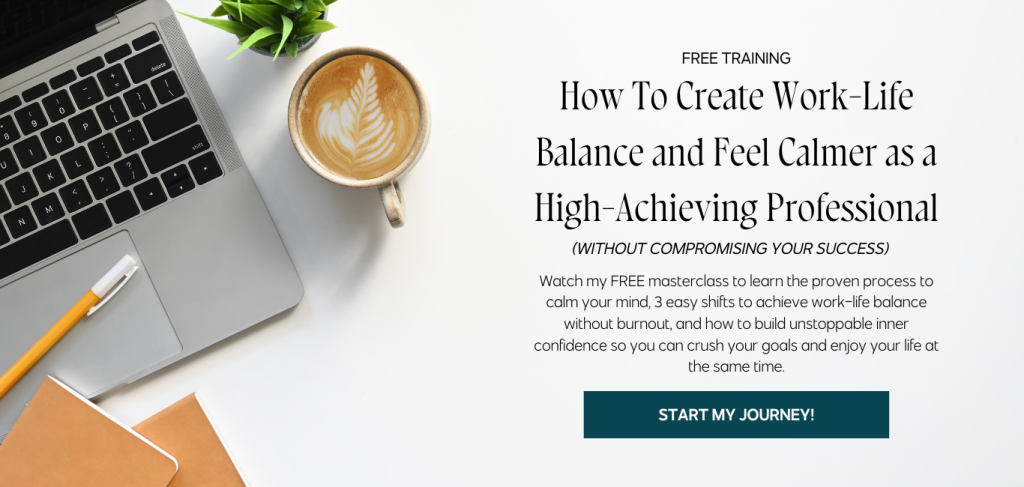
LISTEN, REVIEW, AND SUBSCRIBE TO THE PODCAST!
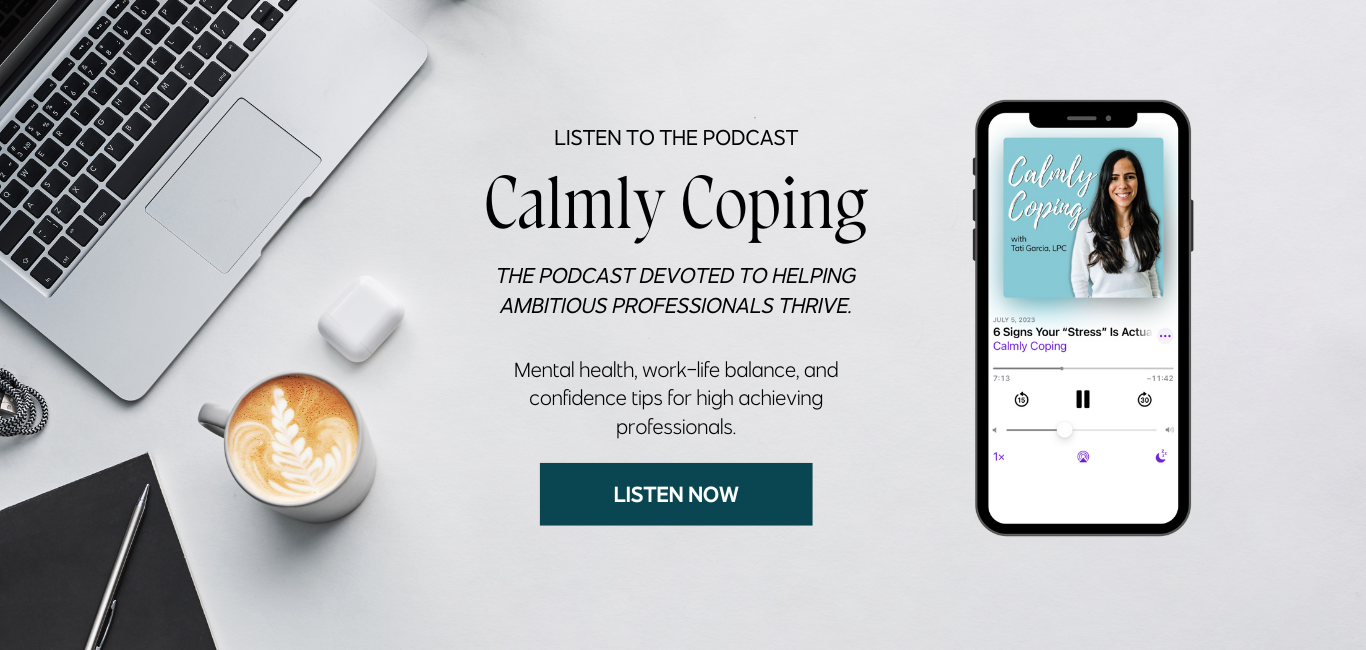
INTRO/OUTRO MUSIC: Rescue Me (Instrumental) by Aussens@iter (c) copyright 2018 Licensed under a Creative Commons Attribution (3.0) license. http://dig.ccmixter.org/files/tobias_weber/57990 Ft: Copperhead
DISCLAIMER: All content here is for informational purposes only. This content does not replace the professional judgment of your own mental health provider. Please consult a licensed mental health professional for all individual questions and issues.
Interested in diving deeper to get support for high-functioning anxiety?
I offer 1:1 coaching to help high-achievers overcoming high-functioning anxiety so they can feel calmer, more present, and have improved balance in their lives. Click here if you’re interested in learning more and getting started.
Calm, Balanced, & Confident is my comprehensive A→Z self-paced course to help high-achieving professionals overcome high-functioning anxiety so they can feel calmer, balanced, and more confident without the anxiety and overwhelm. Click here to learn more and enroll today.
Looking for ongoing support and guidance with high-functioning anxiety? The Calm & Ambitious Community is the exclusive community for high achievers with high-functioning anxiety. Click here to learn more and join us today!
TRANSCRIPT:
Click to view the episode transcript.
Stop being so hard on yourself. I know that you think that being hard on yourself is helping you to get things done is what you need to do in order to accomplish things. However, it’s oftentimes the opposite of that. And even if you recognize that being hard on yourself, isn’t helping you, it can really be hard to get out of that pattern.
So today I’m going to talk about what happens, why you’ve become so hard on yourself and what you can do about it. This is going to be more of a pep talk episode rather than specific strategies or tips, but I may throw those in here and they’re kind of doing this one a little off the cuff. So we’ll see how it goes, but yeah, let’s get into it.
Welcome to Calmly Coping. My name is Tati Garcia and I’m a licensed therapist and coach specializing in high functioning anxiety. I help high achievers stop putting themselves last so they can feel calm, balanced, and confident from within. If this topic interests you, then please like, subscribe, and hit the notification bell so you’ll be notified every time I release a new episode.
Thank you so much for tuning in. So when you’re hard on yourself, what does this look like? It’s when you put a lot of pressure on yourself and maybe you have high expectations and you feel like you need to have this excess kind of weight that you feel, this pressure that you need to do things a certain way or you need to have a certain level of stress.
When it comes to getting the things that you need to do done, it can also look like overthinking. So maybe because you’re being hard on yourself, then you are worried about what the consequences could be. You want to do things the right way. There can be some perfectionism wanting to do things the perfect way.
And because of that, maybe you overthink things. Maybe you procrastinate things because. There is this level of this needs to be done a certain way. I was actually watching an episode of Curb Your Enthusiasm last night. If you have ever seen the show, it’s, it’s a funny show. And I’m, I think in like season three or something like that.
I’m watching it all the way from the beginning. And in this episode, they are starting a restaurant and one of the chefs all of a sudden quits and he says, I can’t do it. There’s too much pressure. You know, there’s going to be all of these people reviewing this restaurant and there’s all of these expectations now.
And I’m kind of paraphrasing, but this is kind of a, an example of. how pressure can affect us. In this situation, this chef was like, it’s too much. I just kind of want to be in my own lane and do my own thing and not deal with this potential criticism or these reviews that I might receive from these food critics.
And, uh, That’s perfectly okay if you’re in that place. However, especially if you’re listening to this podcast, I’m assuming you’re somebody who is ambitious, who has goals to improve yourself, to work towards things in your career. And that’s not a bad thing, but sometimes that can kind of go along with the pressure and the stress that you put upon yourself.
That can, create this kind of never ending hamster wheel of feeling like you need to continue to be hard on yourself. And ultimately, working towards things and risking discomfort or failure is necessary to get the reward on the other side, whatever that is for you. So it can also look like a lot of self criticism.
So maybe you are already criticizing yourself in anticipation of receiving criticism from others. So you want to kind of hurt yourself first, first before anybody else can. So it can look like saying really harsh and mean things to yourself, beating yourself up internally, and just being that kind of harsh coach or that harsh teacher or harsh parent that has been internalized within you and now become a part of your own inner monologue.
And it can also look like all or nothing thinking. So this kind of aligns with the perfectionism that I described previously, where like it’s either perfect or it’s terrible. And this can relate to work ethic, where you feel like you need to put pressure on yourself to do work either 150%, 200 percent beyond what you’re supposed to be doing.
Or that means that. It’s a failure. You’re not doing enough. You’re just constantly falling short, even though you’re probably doing exactly what you have to be doing or more than that. However, your unrealistic expectations, that high pressure you’re putting on yourself, that being hard on yourself is making it appear like it’s not enough.
And you might fear that you’re going to drop the ball and this can then create more stress, anxiety, and self criticism. This can be rooted in a belief that I need to be hard on myself to be successful. I need to be hard on myself in order to get things done in order to move forward. And you might have learned to put stress and pressure on yourself throughout your life.
Maybe you were the kind of person who left things to the last minute and felt the stress and pressure of getting assignments done helped to motivate you. And so you did that when you were in school or when you were growing up. And so this can look like maybe growing up in a household where this was done, where everybody put pressure on themselves.
pressure on themselves and was hard on themselves. This can look like a lot of different things, maybe in sports or if you played instruments or you did any other extracurriculars and you were taught that you need to be hard on yourself, then we can internalize these things. But ultimately, being hard on yourself, although it feels like it’s motivating you, studies actually demonstrate that it just makes you feel worse.
It just makes you feel like crap about yourself. You’re just beating yourself up. And You’re not necessarily accomplishing more. You’re actually becoming less resilient to failure and less resilient to stress that can come up because who wants to fail when on the other side you anticipate that there’s going to be this like beating yourself up constantly.
The good news is that you can move out of this place of being so hard on yourself and putting so much pressure on yourself. I have successfully done it. I’m not perfect by any means, but Nobody is, but when I think back to the way that I used to speak to myself and how harsh I used to be on myself and how critical I used to be, that it is night and day to where I am now.
And the reality is, being hard on yourself is only making you feel worse. It’s only giving you this false sense of control that, okay, I just need to put this pressure on myself and everything’s going to work out. But that’s not how things work. And you deserve to take care of yourself and be kind to yourself in the process, because otherwise, what are we doing?
We’re just working towards these arbitrary outcomes and feeling miserable in the process. So when are you actually enjoying your life? When are you actually being present for it? When are you actually enjoying the process and the journey? So what can you do instead is by lowering the stress and the pressure, little by little.
This isn’t something that happens overnight, but it’s something that happens when you can start to recognize it and start to change the way you speak to yourself, start to even reduce the level of pressure. So if you notice, let’s say a simple example could be, maybe you’re driving somewhere and you have a plan to be there at a certain time and You put the address into your GPS in your car, you sit in the seat, and you’re ready to go, and it says you’re going to get there about two minutes early, and you’re kind of driving your way there, listening to the radio, but there’s this internal monologue and this tension of like, I need to get there on time, I need to get there on time.
This isn’t helping you get there any more quickly. This is actually just making you feel more stressed and tense. You already have the prediction that you’re going to get there on time. Even if you’re going to get there late, this excess stress and pressure and the internal tension isn’t helping you get there any faster.
It’s just negatively affecting you. And this is something that doesn’t just happen if we’re going to a destination and worried about being late, but it can happen in everything you do, regardless of whether it is warranted or not. Even if it’s something that you’re just doing by yourself for yourself.
This pressure and this tension and being hard on yourself can go along with you because it’s something that can be Just an automatic part of the way that you approach things taking this example and seeing okay Am I doing this to myself in other ways in my life? And when I catch and notice this can I reduce that can I remind myself that this isn’t helping me?
This isn’t helping me to get things done any better. It’s not helping me to get to my destination any more quickly So, how can I? reduce this, remove this, and replace this with support, with compassion, with presence. You know, maybe if you’re in the car going to your location, you can really tune into what you’re listening to on the radio, or you can look around you and enjoy the sights, or enjoy the weather if it’s a nice day, and just be present rather than thinking of what’s coming up next, or what if I’m late, or what if this goes wrong.
And this is a constant practice that you can. bring yourself back to again and again. And the more that you catch yourself and can reduce this and relieve this, the more you are changing your brain and building the muscle of being more present and building the muscle of being kinder to yourself and being more present for yourself.
Part of this is recognizing that you can You can work and you can function and you can even do things that seem hard, that seem like, well, I need to be stressed for this because this is super important. You can do these things from a place of inner groundedness. And by this, I mean, you have this foundation of feeling safe, of feeling secure, of feeling stable, of what’s another way of putting it?
Of feeling like. You are physically and emotionally okay, and that is able to actually allow you to do better work, to be more focused, to be more present, to think more clearly, to have more emotional regulation. Also, that is another shift that can help to allow yourself to recognize that, This stress, this pressure, this being hard on myself actually isn’t helping me do things better.
It’s actually hindering my ability to be present and to be fully focused and to do the best that I can and to show up for the people in my life or to do the best work or to think clearly or to have creative ideas and creative thought. And this can look like reminding yourself, how can I be a better boss to myself?
How can I be a better Parent to myself. This might be a unique concept if you haven’t heard of it before, but in a way we can You know, if you’re somebody who is your own boss, then maybe you’re being a hard boss on yourself, or if you’re somebody who has internalized a harsh parenting style of being that strict parent for yourself, how can you be a kinder, supportive parent?
If you don’t want to think of it as a parent, how can you be a better friend for yourself? Just looking at it as how can you be this better support for yourself and be that encouraging, compassionate, but also disciplined, but not harsh discipline, supportive discipline. This is what I like to call calm ambition.
So it is the marrying of these two concepts of being calm and grounded and being focused, while still having ambition, while still having that drive. But not coming from a place of fear and pressure and I need to get this done. This needs to happen in this way, in this rigidity, but coming from this place of acceptance and flexibility and groundedness.
So I hope some of these concepts that I discussed were helpful for you, maybe to get you thinking in a different way, and This all happens small steps at a time. If you’re looking for more support with any of these concepts, I have multiple ways that you can work with me. So most specifically, I have a signature program to help you to overcome high functioning anxiety, have an obtain this calm groundedness while improving your work life balance and feeling more confident from within called Calm Balance and Confident.
And this is a 90 day course that you go through on your own. with some additional bonus community support in the community is my common ambitious community for high achievers, where we have monthly supportive coaching calls, resources, and things like book clubs and workshops to help you on your journey to feeling like a winner.
calm and ambitious from within. So you can either do both of these together when you sign up for calm, balanced and confident, or you can just do the community component when you sign up for the Calm and ambitious community. If you’re interested in learning about either of these, you can click on the work with me.
link in the description or the show notes below wherever you’re listening and I thank you so much for tuning in if you’re interested in Leaving your thoughts about the podcast asking a question Maybe giving some feedback on this topic. You can go to calmly coping comm slash message and Here you can share a voice message that I could potentially share on the podcast while you wait for next week’s episode I have other episodes about calming your mind improving work life balance and And increasing your confidence from within.
You can check out these episodes here. Thank you so much for tuning in today and until next time, be calm.
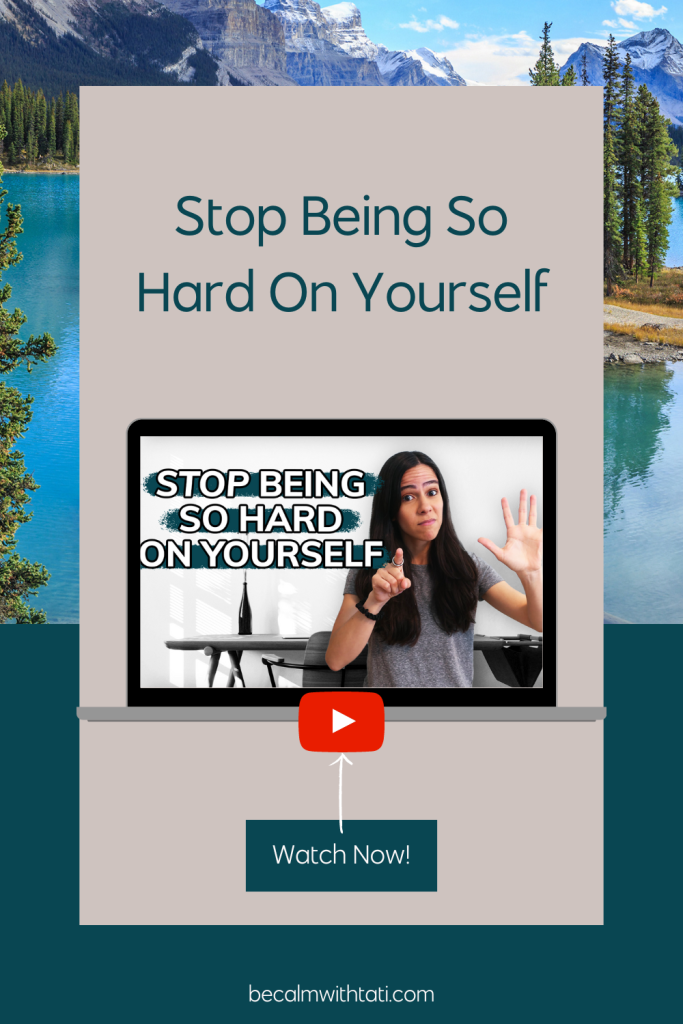
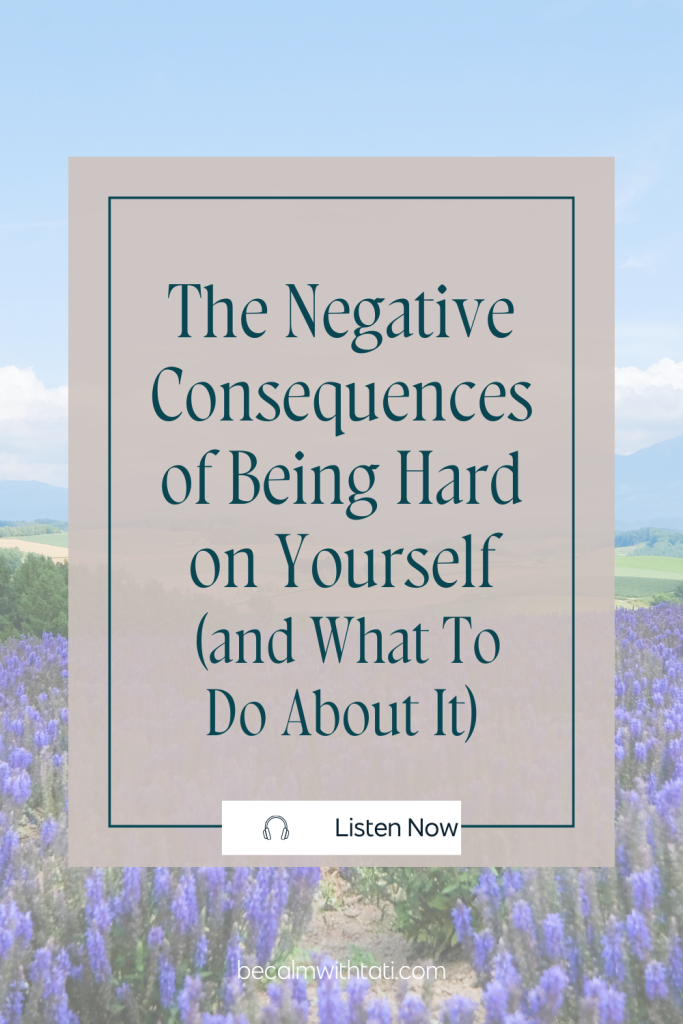
Until next time…






